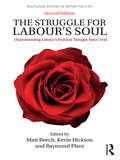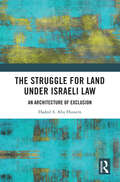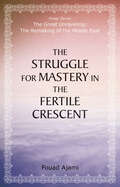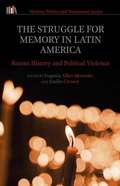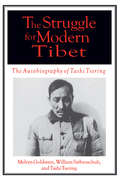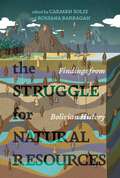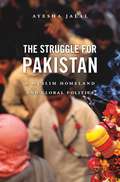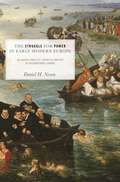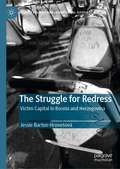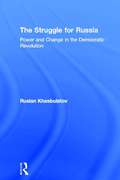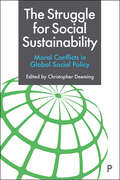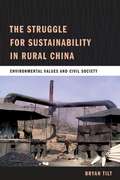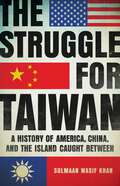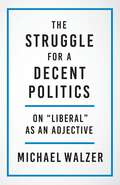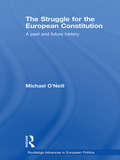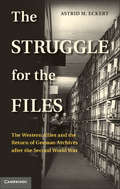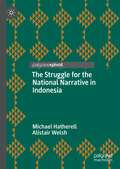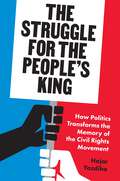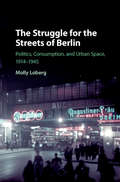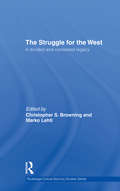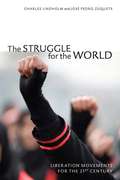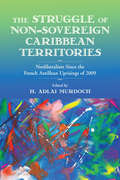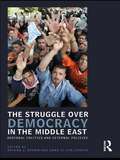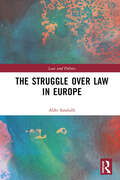- Table View
- List View
The Struggle for Labour's Soul: Understanding Labour's Political Thought Since 1945
by Matt Beech Raymond Plant Kevin HicksonThe election of the most left-wing Labour Party Leader since 1945, followed by the Party's third consecutive general election defeat and the ongoing cultural divisions around Brexit present an ideal opportunity for a thorough re-evaluation of the state of the Party within its broader ideological and historical context. This second edition of this highly respected book analyses the current developments and places them in their historical setting through a clear three-part framework of Ideological Positions, Struggles and Commentaries. Thoroughly updated and featuring contributions by leading academics and politicians, it continues to represent one of the most ground-breaking and thorough analyses of Labour's political thought in a generation and will be of key interest to scholars, students and observers of British Politics, British History, Party Politics, and the Labour Party.
The Struggle for Land Under Israeli Law: An Architecture of Exclusion
by Hadeel S. Abu HusseinThis book provides a comprehensive examination of land law for Arab Palestinians under Israeli law. Land is one of the core resources of human existence, development and activity. Therefore, it is also a key basis of political power and of social and economic status. Land regimes and planning regulations play a dynamic role in deciding how competing claims over resources will be resolved. According to legal geography, spatial ordering impacts legal regimes; whilst legal rules form social and human space. Through the lenses of international law, colonisation and legal geography, the book examines the land regime in Israel. More specifically, it endeavours to understand the spatial strategies adopted by Israel to organise the entire territorial expanse of the country as Jewish, while also excluding Arab Palestinian citizens of Israel and residents of East Jerusalem from the landscape. The book then details how the systematic nature and processes of marginalisation are mapped out across the civil, political and socio-economic landscape. This monograph will be of interest to international legal theorists, legal geographers, land lawyers and human rights practitioners and students; as well as to international scholars, NGOs and others focusing on the Israeli–Palestinian conflict.
The Struggle for Mastery in the Fertile Crescent (The Great Unraveling: The Remaking of th)
by Fouad AjamiIn this book, Fouad Ajami analyzes the struggle for influence along the Fertile Crescent—the stretch of land that runs from Iran's border with Iraq to the Mediterranean—among three of the regional powers who have stepped into the vacuum left by the West: Iran, Turkey, and Saudi Arabia. He explains that, of the three powers competing for influence, Saudi Arabia and Iran are in it for the long haul. Each of those powers has a sense of mission and constituencies that enable them to stick it out and pay the price for a sphere of influence. Each country's prospects for supremacy is detailed and Ajami asserts that Iran must ultimately be reckoned to be the strongest.
The Struggle for Memory in Latin America
by Eugenia Allier-Montaño Emilio CrenzelThis multi-disciplinary volume analyzes struggles over the memory of past political violence in Argentina, Brazil, Chile, Colombia, the United States, Guatemala, El Salvador, Mexico, Paraguay, Peru, and Uruguay. Each chapter offers a comprehensive history of the political violence that occurred in the second half of the twentieth century, analyzing its links with 1) the international context of the cold war, 2) the particular forms of repression and authoritarianism that prevailed in the domestic setting, 3) the social inequalities that were reinforced, and 4) the political, economic, and cultural transformations that Latin American societies were undergoing at the time. Considering the different paths that Latin American countries have taken in their efforts to confront history, the chapters examine how relevant actors look back on past events and vie with one another to give these events meaning in the public sphere. For each country examined, contributors consider the initiatives of transnational, regional, and national actors, as well as factors including class, gender, ethnicity, and geographic location. Chapters give political- and social-historical perspectives and employ tools from a variety of disciplines, including memory studies, history, political science, sociology, and anthropology.
The Struggle for Modern Tibet: The Autobiography of Tashi Tsering (Mellen Studies In Education Ser. #Vol. 88)
by Melvyn C. Goldstein William R Siebenschuh Tashi TseringThis captivating autobiography by a Tibetan educator and former political prisoner is full of twists and turns. Born in 1929 in a Tibetan village, Tsering developed a strong dislike of his country's theocratic ruling elite. As a 13-year-old member of the Dalai Lama's personal dance troupe, he was frequently whipped or beaten by teachers for minor infractions. A heterosexual, he escaped by becoming a drombo, or homosexual passive partner and sex-toy, for a well-connected monk. After studying at the University of Washington, he returned to Chinese-occupied Tibet in 1964, convinced that Tibet could become a modernized society based on socialist, egalitarian principles only through cooperation with the Chinese. Denounced as a 'counterrevolutionary' during Mao's Cultural Revolution, he was arrested in 1967 and spent six years in prison or doing forced labor in China. Officially exonerated in 1978, Tsering became a professor of English at Tibet University in Lhasa. He now raises funds to build schools in Tibet's villages, emphasizing Tibetan language and culture.
The Struggle for Natural Resources: Findings from Bolivian History (Diálogos Series)
by Carmen Soliz and Rossana BarragánThe Struggle for Natural Resources traces the troubled history of Bolivia's land and commodity disputes across five centuries, combining local, regional, national, and transnational scales. Enriched by the extractivism and commodity frontiers approaches to world history, the book treats Bolivia's political struggles over natural resources as long-term processes that outlast immediate political events. Exploration of the Bolivian case invites dialogue and comparison with other parts of the world, particularly regions and countries of the so-called Global South.The book begins by examining three Bolivian resources at the center of political dispute since the early colonial period, namely land, water, and minerals. Carmen Soliz, Rossana Barragán, and Sarah Hines show that, as in the colonial and early republican past, these resources have remained the focus of political contention to the present day. Until the end of the nineteenth century, Bolivia's battle over natural resources was primarily concentrated in the highlands and inter-Andean valleys. Beginning in the 1860s, the bicycle and soon the automobile industries triggered demand for natural rubber found in the heart of the Amazon. José Orsag analyzes the impact of this extractive economy at the turn of the twentieth century. The book concludes by examining two resources that are central to understanding the last century of Bolivia's history. Kevin Young examines the fraught business of hydrocarbons, and Thomas Grisaffi analyzes the coca/cocaine circuit. Each chapter studies the social dynamics and political conflicts that shaped the processes of extraction, exchange, and ownership of each of these resources
The Struggle for Pakistan
by Ayesha JalalEstablished as a homeland for India’s Muslims in 1947, Pakistan has had a tumultuous history that has unfolded in the vortex of dire regional and international conflicts. Beset by assassinations, coups, ethnic strife, and the breakaway of Bangladesh in 1971, the country has found itself too often contending with religious extremism and military authoritarianism. Now, in a probing biography of her native land amid the throes of global change, Ayesha Jalal provides an insider’s assessment of how this nuclear-armed Muslim nation evolved as it did and explains why its dilemmas weigh so heavily on prospects for peace in the region. <p><p> Attentive to Pakistan’s external relations as well as its internal dynamics, Jalal shows how the vexed relationship with the United States, border disputes with Afghanistan in the west, and the conflict with India over Kashmir in the east have played into the hands of the generals who purchased security at the cost of strong democratic institutions. Combined with domestic ethnic and regional rivalries, such pressures have created a siege mentality that encourages military domination and militant extremism. <p> Since 9/11, the country has been widely portrayed as a breeding ground for Islamic terrorism. Assessing the threats posed by Al-Qaeda and the Taliban as American troops withdraw from Afghanistan, Jalal contends that the battle for Pakistan’s soul is far from over. Her definitive biography reveals how pluralism and democracy continue to struggle for a place in this Muslim homeland, where they are so essential to its future.
The Struggle for Power in Early Modern Europe: Religious Conflict, Dynastic Empires, and International Change (Princeton Studies in International History and Politics #116)
by Daniel H. NexonScholars have long argued over whether the 1648 Peace of Westphalia, which ended more than a century of religious conflict arising from the Protestant Reformations, inaugurated the modern sovereign-state system. But they largely ignore a more fundamental question: why did the emergence of new forms of religious heterodoxy during the Reformations spark such violent upheaval and nearly topple the old political order? In this book, Daniel Nexon demonstrates that the answer lies in understanding how the mobilization of transnational religious movements intersects with--and can destabilize--imperial forms of rule. Taking a fresh look at the pivotal events of the sixteenth and seventeenth centuries--including the Schmalkaldic War, the Dutch Revolt, and the Thirty Years' War--Nexon argues that early modern "composite" political communities had more in common with empires than with modern states, and introduces a theory of imperial dynamics that explains how religious movements altered Europe's balance of power. He shows how the Reformations gave rise to crosscutting religious networks that undermined the ability of early modern European rulers to divide and contain local resistance to their authority. In doing so, the Reformations produced a series of crises in the European order and crippled the Habsburg bid for hegemony. Nexon's account of these processes provides a theoretical and analytic framework that not only challenges the way international relations scholars think about state formation and international change, but enables us to better understand global politics today.
The Struggle for Redress: Victim Capital in Bosnia and Herzegovina (Memory Politics and Transitional Justice)
by Jessie Barton-HronešováThis book explores pathways to redress for main groups of victims/survivors of the 1992-5 Bosnian war —families of missing persons, victims of torture, survivors of sexual violence, and victims suffering physical disabilities and harm. The author traces the history of redress-making for each of these groups and shows how differently they have been treated by Bosnian authorities at the state and subnational level. In Bosnia and Herzegovina, thousands of war victims have had to suffer re-traumatising ordeals in order to secure partial redress for their suffering during 1992–1995 and after. While some, such as victims of sexual violence, have been legally recognised and offered financial and service-based compensation, others, such as victims of torture, have been recognized only recently with a clear geographical limitation. The main aim of the book is to explore the politics behind recognizing victimhood and awarding redress in a country that has been divided by instrumentalized identity cleavages, widespread patronage and debilitating war legacies. It shows how war victims/survivors navigate such fragmented and challenging public landscape in order to secure their rights.
The Struggle for Russia: Power and Change in the Democratic Revolution
by Ruslan KhasbulatovRuslan Khasbulatov has played a central role in the dramatic changes in Russia over the last three years. He became Acting Speaker of the Russian parliament in July 1991 and helped to defend the Russian White House during the coup attempt of that August. He has since consolidated his influence in the Parliament, and has become one of the country's most powerful and controversial politicians. In this book, Khasbulatov presents his views on Russian politics before the coup, offers a vivid first-hand account of the resistance to the coup, and concludes with his views on the problem of power in the new Russia. He provides a unique insight into the development of Russia from communism to embryonic democracy and an unparalleled insider's account of some of the most momentous events of the late twentieth century.
The Struggle for Social Sustainability: Moral Conflicts in Global Social Policy
by Christopher DeemingThe ongoing social crises and moral conflicts evident in global social policy debates are addressed in this timely volume. Leading interdisciplinary scholars focus on the ‘social’ of social policy, which is increasingly conceived in a globalised form, as new international agreements and global goals engender social struggles. They tackle pressing ‘social questions’, many of which have been exacerbated by COVID-19, including growing inequality, changing world population, ageing societies, migration and intersectional disadvantage. This ground-breaking volume critically engages with contested conceptions of the social which are increasingly deployed by international institutions and policy makers. Focusing on social sustainability, social cohesion, social justice, social wellbeing and social progress this text is even more crucial as policy makers look to accelerate socially sustainable solutions to the world’s biggest challenges.
The Struggle for Sustainability in Rural China: Environmental Values and Civil Society
by Bryan TiltThough China's economy is projected to become the world's largest within the next twenty years, industrial pollution threatens both the health of the country's citizens and the natural resources on which their economy depends. Capturing the consequences of this reality, Bryan Tilt conducts an in-depth, ethnographic study of Futian Township, a rural community reeling from pollution. The industrial township is located in the populous southwestern province of Sichuan. Three local factories-a zinc smelter, a coking plant, and a coal-washing plant-produce air and water pollution that far exceeds the standards set by the World Health Organization and China's Ministry of Environmental Protection. Interviewing state and company officials, factory workers, farmers, and scientists, Tilt shows how residents cope with this pollution and how they view its effects on health and economic growth. Striking at the heart of the community's environmental values, he explores the intersection between civil society and environmental policy, weighing the tradeoffs between protection and economic growth. Tilt ultimately finds that the residents are quite concerned about pollution, and he investigates the various strategies they use to fight it. His study unravels the complexity of sustainable development within a rapidly changing nation.
The Struggle for Taiwan: A History of America, China, and the Island Caught Between
by Sulmaan Wasif KhanA concise, definitive history of the precarious relationship among the US, China, and Taiwan As tensions over Taiwan escalate, the United States and China stand on the brink of a catastrophic war. Resolving the impasse demands we understand how it began. In 1943, the Allies declared that Japanese-held Taiwan would return to China at the conclusion of World War II. The Chinese civil war led to a change of plans. The Communist Party came to power in China and the defeated Nationalist leader, Chiang Kai-shek, fled to Taiwan, where he was afforded US protection. The specter of conflict has loomed ever since. In The Struggle for Taiwan, Sulmaan Wasif Khan offers the first comprehensive history of the triangular relationship between the United States, China, and Taiwan, exploring America&’s ambivalent commitment to Taiwan&’s defense, China&’s bitterness about the separation, and Taiwan&’s impressive transformation into a flourishing democracy. War is not inevitable, Khan shows, but to avoid it, decision-makers must heed the lessons of the past. From the White Terror to the Taiwan Straits Crises, from the normalization of Sino-American relations to Trump-era rising tensions, The Struggle for Taiwan charts the paths to our present predicament to show what futures might be possible.
The Struggle for a Decent Politics: On "Liberal" as an Adjective
by Michael WalzerA testament to what it means to be liberal by one of the most prominent political philosophers of our era There was a time when liberalism was an ism like any other, but that time, writes Michael Walzer, is gone. “Liberal” now conveys not a specific ideology but a moral stance, so the word is best conceived not as a noun but as an adjective—one is a “liberal democrat” or a “liberal nationalist.” Walzer itemizes the characteristics described by “liberal” in an inventory of his own deepest political and moral commitments—among other things, to the principle of equality, to the rule of law, and to a pluralism that is both political and cultural. Unabashedly asserting that liberalism comprises a universal set of values (“they must be universal,” he writes, “since they are under assault around the world”), Walzer reminds us in this inspiring book why those values are worth fighting for.
The Struggle for the Eurasian Borderlands
by Alfred J. RieberThis is the first in a trilogy of books to explore the Eurasian borderlands as contested 'shatter zones' which have generated some of the world's most significant conflicts. Analysing the struggles of the Habsburg, Russian, Ottoman, Iranian and Qing Empires, Alfred Rieber surveys the period from the rise of the great multicultural, conquest empires in the late medieval/early modern period to their collapse in the early twentieth century. He charts how these empires expanded along moving, military frontiers, competing with one another in war, diplomacy and cultural practices whilst the subjugated peoples of the borderlands strove to maintain their cultures and defend their autonomy. The gradual and fragmentary adaptation of western constitutional ideas, military reforms, cultural practices and economic penetration began to undermine these ruling ideologies and institutions leading to the collapse of all five empires in revolution and war within little more than a decade between 1911 and 1923.
The Struggle for the European Constitution: A Past and Future History (Routledge Advances in European Politics)
by Michael O'NeillThe European Union (EU) Constitution was one of the most important developments in the history of the EU, aiming to make the EU more transparent, relevant and accountable to the citizens of its member states. Current anxieties over the pace and direction of EU integration place this comprehensive study at the forefront of the EU governance debate. O’Neill goes far beyond a simple account of the EU Constitution, focussing also on the response to the current crisis of confidence between the Union and its citizens and how those in power have responded to the challenge. Making a substantial contribution to literature on the EU, key discussion points include: The political crisis behind the Constitution The power politics at work in the negotiations How the Constitution affects EU policymaking The impact on the citizens of the EU This is essential reading for all those wishing to understand the background to one of the key areas within European Politics. Michael O’Neill is Jean Monnet Professor in EU Politics at Nottingham Trent University.
The Struggle for the Files
by Astrid M. EckertWhen American and British troops swept through the German Reich in the spring of 1945, they confiscated a broad range of government papers and archives. These records were subsequently used in war crimes trials and published under Allied auspices to document the German road to war. In 1949, the West Germans asked for their return, considering the request one of the benchmarks of their new state sovereignty. This book traces the tangled history of the captured German records and the extended negotiations for their return into German custody. Based on meticulous research in British, American and German archives, The Struggle for the Files highlights an overlooked aspect of early West German diplomacy and international relations. All participants were aware that the files constituted historical material essential to write German history and at stake was nothing less than the power to interpret the recent German past.
The Struggle for the National Narrative in Indonesia
by Michael Hatherell Alistair WelshThis book offers a unique analysis of how political representatives construct ideas about the nation in contemporary Indonesian politics. In their struggle to define what the authors call the ‘national narrative’, would-be national leaders seek to develop a story about the nation’s past, present and future. These stories feature a unique plot, set of characters, and a moral that the political narrator hopes will resonate. In contemporary Indonesia, the authors assess two prominent national narratives: the technocratic and populist national narratives. The book concludes with an analysis that considers other potential sources of ideas about the nation, as well as the potential implications for domestic politics and Indonesian grand strategy.
The Struggle for the People’s King: How Politics Transforms the Memory of the Civil Rights Movement
by Hajar YazdihaHow the misuses of Martin Luther King’s legacy divide us and undermine democracyIn the post–civil rights era, wide-ranging groups have made civil rights claims that echo those made by Black civil rights activists of the 1960s, from people with disabilities to women’s rights activists and LGBTQ coalitions. Increasingly since the 1980s, white, right-wing social movements, from family values coalitions to the alt-right, now claim the collective memory of civil rights to portray themselves as the newly oppressed minorities. The Struggle for the People’s King reveals how, as these powerful groups remake collective memory toward competing political ends, they generate offshoots of remembrance that distort history and threaten the very foundations of multicultural democracy.In the revisionist memories of white conservatives, gun rights activists are the new Rosa Parks, antiabortion activists are freedom riders, and antigay groups are the defenders of Martin Luther King’s Christian vision. Drawing on a wealth of evidence ranging from newspaper articles and organizational documents to television transcripts, press releases, and focus groups, Hajar Yazdiha documents the consequential reimagining of the civil rights movement in American political culture from 1980 to today. She shows how the public memory of King and civil rights has transformed into a vacated, sanitized collective memory that evades social reality and perpetuates racial inequality.Powerful and persuasive, The Struggle for the People’s King demonstrates that these oppositional uses of memory fracture our collective understanding of who we are, how we got here, and where we go next.
The Struggle for the Streets of Berlin: Politics, Consumption, and Urban Space, 1914-1945
by Molly LobergWho owns the street? Interwar Berliners faced this question with great hope yet devastating consequences. In Germany, the First World War and 1918 Revolution transformed the city streets into the most important mass media for politics and commerce. There, partisans and entrepreneurs fought for the attention of crowds with posters, illuminated advertisements, parades, traffic jams, and violence. The Nazi Party relied on how people already experienced the city to stage aggressive political theater, including the April Boycott and Kristallnacht. Observers in Germany and abroad looked to Berlin’s streets to predict the future. They saw dazzling window displays that radiated optimism. They also witnessed crime waves, antisemitic rioting, and failed policing that pointed toward societal collapse. Recognizing the power of urban space, officials pursued increasingly radical policies to “revitalize” the city, culminating in Albert Speer’s plan to eradicate the heart of Berlin and build Germania.
The Struggle for the West: A Divided and Contested Legacy (Routledge Critical Security Studies)
by Christopher Browning Marko LehtiIn recent years debates about the nature and future of the West have been high on the political agenda. Prognoses of the West's imminent demise have been countered by those arguing for its continued relevance, or those arguing that while the West will survive its nature, and the balance of power between its constituent units, is transforming. This book argues that understanding contemporary developments requires subjecting the very idea of the West to critical scrutiny and in particular asking what kind of concept it actually is. Locating the West as a discursive concept the book argues attempts to save, fix or reclaim the meaning of the West are illustrative of political agendas rather than indicative of accurate claims about the essential nature of the West. In contrast, the book argues that as a concept the West is impregnated with various discursive legacies, the most embedded of which are those of a civilisational, modern and political West. However, while attempts to define the West's essence are therefore doomed to fail, given the concept's historical and discursive flexibility, such attempts reaffirm the legitimising role which claims to the West continue to perform. Beyond this, the book challenges traditional genealogies of the West, which overwhelmingly depict the West as an inside-out concept. In contrast, the book argues that historically outsiders have played an important role in defining the nature of the West and constituting it as a political subject; processes that remain evident today. This book will particularly interest students of critical security studies, critical geopolitics, European politics, American politics and IR theory.
The Struggle for the World: Liberation Movements for the 21st Century
by Charles Lindholm José Pedro ZúqueteThis volume employs "archival anthropology" in an attempt to understand the common characteristics of seemingly diverse movements acting in opposition to capitalist globalization around the world. The authors analyze documents associated with the movements (e. g. , communiqués, statements of purpose, et cetera) and other materials in order to explicate how the various movements see themselves and their relationship to the struggle for a better world in a series of case studies. They conclude by identifying shared features, dynamics, and goals of utopian resistance to globalization; considering why such commonalities exist; and interpreting implications. Annotation ©2010 Book News, Inc. , Portland, OR (booknews. com)
The Struggle of Non-Sovereign Caribbean Territories: Neoliberalism Since The French Antillean Uprisings of 2009 (Critical Caribbean Studies)
by Paget Henry Michael Sharpe Louise Hardwick Hanétha Vété-Congolo Alessandra Benedicty-Kokken Rose Mary Allen Malcom Ferdinand Vincent Joos Jacqueline Lazú Alix PierreThe Struggle of Non-Sovereign Caribbean Territories is an essay collection made up of two sections; in the first, a group of anglophone and francophone scholars examines the roots, effects and implications of the major social upheaval that shook Guadeloupe, Martinique, French Guiana, and Réunion in February and March of 2009. They clearly demonstrate the critical role played by community activism, art and media to combat politico-economic policies that generate (un)employment, labor exploitation, and unattended health risks, all made secondary to the supremacy of profit. In the second section, additional scholars provide in-depth analyses of the ways in which an insistence on capital accumulation and centralization instantiated broad hierarchies of market-driven profit, capital accumulation, and economic exploitation upon a range of populations and territories in the wider non-sovereign and nominally sovereign Caribbean from Haiti to the Dutch Antilles to Puerto Rico, reinforcing the racialized patterns of socioeconomic exclusion and privatization long imposed by France on its former colonial territories.
The Struggle over Democracy in the Middle East: Regional Politics and External Policies (UCLA Center for Middle East Development (CMED) series)
by Nathan Brown Emad ShahinMany residents of the Middle East - and more recently, Western powers - have placed great hope in democratization in the region. Yet authoritarianism remains the norm and movement towards democracy is both slow and uneven. The Struggle over Democracy in the Middle East examines democracy and democratization in the light of regional realities rather than the wishful thinking of outsiders. Specialists from the region analyze democratic prospects in the region, while accomplished scholars from the United States and the United Kingdom analyze Western policy, providing a wide-ranging survey of the efforts of individual countries and the effect of external influences. Addressing themes including sectarianism, culture, religion, security and the promotion of democracy, the book examines the experiences of activists, political parties, religious groups and governments and highlights the difficulties involved in bringing democracy to the Middle East. Providing a multifaceted approach to the issue of democratization, this book will be a valuable reference for courses on Middle Eastern politics, political science and democracy.
The Struggle over Law in Europe (ISSN)
by Aldo SandulliThis book examines the role of law in Europe at a time when economic policies have become dominant not only on this continent but globally. Can law be seen as a mere infrastructure? Or does it contribute to defining the social and legal order through its own inherent rules? If the second hypothesis is true, what might these rules be, and how may they be identified? Lastly, to what extent can agreeing a definition of the role of law affect the future of Europe? With the Next Generation European Union, the EU has introduced an unprecedented investment plan for economic recovery and resilience. In doing so, it has become the most important financial intermediary on the continent. But is this simply the prelude to a European economic and financial revival, or does it also aim to strengthen the European legal order in social, political, and constitutional terms? This book argues that the role of law in Europe should be to achieve a balanced relationship between freedom and solidarity; encouraging economic competition, but also social cohesion. Analyzing the role of law in the project of European integration, it maintains that law should be more than an infrastructure for finance and economics, showing how it can act as a guide and a binding force to achieve a more balanced relationship between economics, politics, and law. This book will be of interest to scholars in the fields of public law, European law, law and economics, the philosophy of law, legal history, political theory, and political science, as well as others concerned with the future of European integration.
